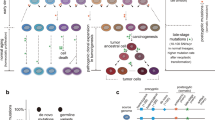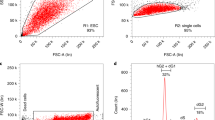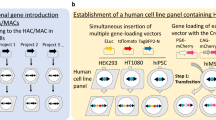Abstract
INTRASPECIES contamination of cell cultures is a serious technical problem when more than one cell line is maintained in continuous serial subculture within a laboratory. Biochemical1–3 and immunological4,5 evidence has strongly suggested that many “cell lines” that are commonly used in the laboratory around the world have been contaminated with HeLa cells. Chromosome rearrangements resulting in specific “markers” provide a unique opportunity to monitor for intralinear specificity in HeLa and other human cells. Because certain cell lines in the American Type Culture Collection (ATCC) repository have already been shown to possess the type A (fast) G6PD characteristic of HeLa, we initiated a survey of these cell lines for the chromosome features described for HeLa cells6–9 using the trypsin–Giemsa banding technique10. Ten cell lines, including two HeLa lines, have been studied so far. Five of these lines have been found to contain marker chromosomes typical of HeLa cells. The non-HeLa cell lines have chromosome characteristics of their own which can also be used to monitor their purity.
This is a preview of subscription content, access via your institution
Access options
Subscribe to this journal
Receive 51 print issues and online access
$199.00 per year
only $3.90 per issue
Buy this article
- Purchase on Springer Link
- Instant access to full article PDF
Prices may be subject to local taxes which are calculated during checkout
Similar content being viewed by others
References
Gartler, S. M., Natn. Cancer Inst. Monogr., 26, 167–195 (1966).
Peterson, W. D., Jr, Stulberg, C. S., Swanborg, N. K., and Robinson, A. R., Proc. Soc. exp. Biol. Med., 128, 772–778 (1968).
Montes, de Oca, F., Macy, M. L., and Shannon, J. E., Proc. Soc. exp. Biol. Med., 132, 462–469 (1969).
Franks, D., Gurner, B. W., Coombs, R. R. A., and Stevenson, R., Expl Cell Res., 28, 608–612 (1962).
Espmark, J. Å., Ahlqvist-Roth, L., Chappel, P. J., and Cartwright, L. N., Abstracts of the Annual Meeting of the Am. Soc. for Microbiol., 127 (1973).
Miller, O. J., Miller, D. A., Allderdice, P. W., Dev, V. G., and Grewal, M. S., Cytogenetics, 10, 338–346 (1971).
Francke, U., Hammond, D. S., and Schneider, J. A., Chromosoma, 41, 111–121 (1973).
Nelson-Rees, W. A., Flandermeyer, R. R., and Hawthrone, P. K., Science, 184, 1093–1096 (1974).
Lavappa, K. S., Macy, M. L., and Shannon, J. E., In Vitro, 10, 374–375 (1975).
Seabright, M., Lancet, ii, 971–972 (1971).
Czaker, R., Humangenetik, 19, 135–144 (1973).
Walker, J. F., J. natn. Cancer Inst., 51, 113–116 (1973).
Shannon, J. E., and Macy, M. L., Registry of Animal Cell Lines, second ed. (American Type Culture Collection, 1972).
Eagle, H., Proc. Soc. exp. Biol. Med., 89, 362–364 (1955).
Author information
Authors and Affiliations
Rights and permissions
About this article
Cite this article
LAVAPPA, K., MACY, M. & SHANNON, J. Examination of ATCC stocks for HeLa marker chromosomes in human cell lines. Nature 259, 211–213 (1976). https://doi.org/10.1038/259211a0
Received:
Accepted:
Issue Date:
DOI: https://doi.org/10.1038/259211a0
This article is cited by
-
Polyunsaturated fatty acids induce modification in the lipid composition and the prostaglandin production of the conjunctival epithelium cells
Graefe's Archive for Clinical and Experimental Ophthalmology (2012)
-
The proapoptotic effect of hepatitis B virus HBx protein correlates with its transactivation activity in stably transfected cell lines
Oncogene (1999)
-
Characterization of epithelial primary cultures from human conjunctiva
Graefe's Archive for Clinical and Experimental Ophthalmology (1997)
-
A new DNA profiling system for cell line identification for use in cell banks in Japan
In Vitro Cellular & Developmental Biology - Animal (1992)
-
Assignment of the genes for mouse type I procollagen to chromosome 16 using mouse fibroblast-Chinese hamster somatic cell hybrids
Somatic Cell Genetics (1983)
Comments
By submitting a comment you agree to abide by our Terms and Community Guidelines. If you find something abusive or that does not comply with our terms or guidelines please flag it as inappropriate.



